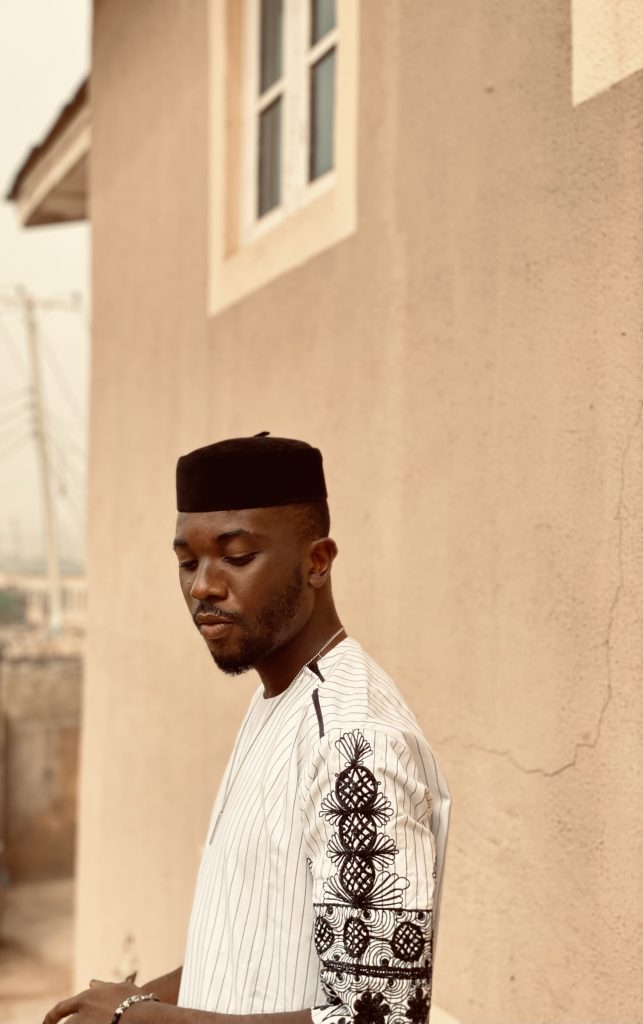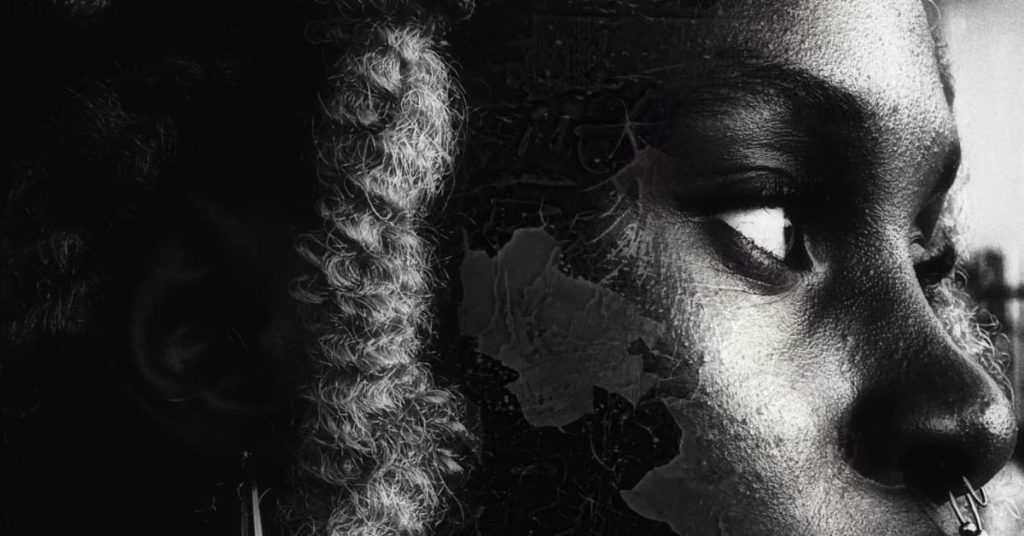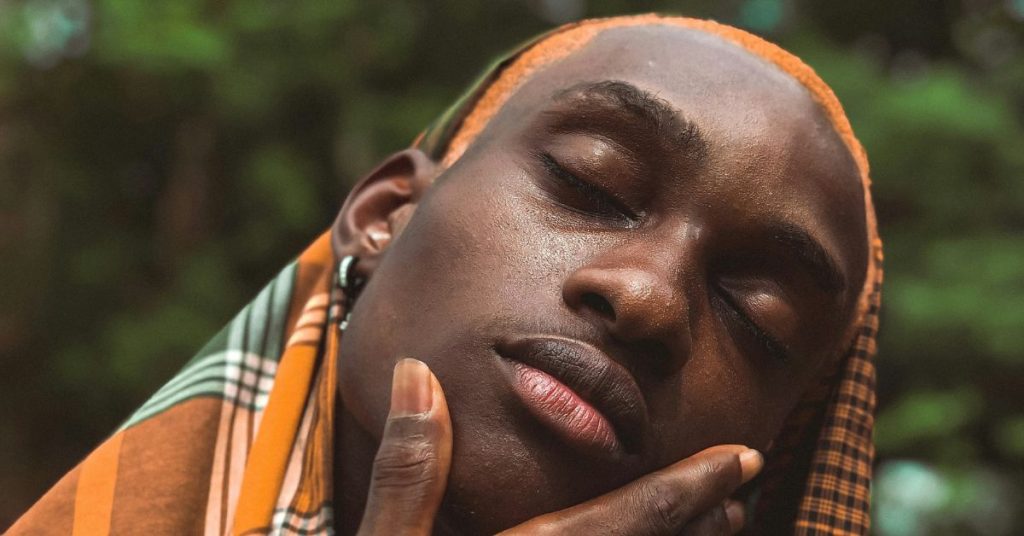Image Credit: thatselby on Unsplash
Matthew met Martha at the church where he was a drummer and she an usher. Before the Fallen could tempt the Chosen a third time, he asked, “Do you?” and sure as the Baptist she answered, “I do!” Because no one had any reason why they shouldn’t, the two were made one in the presence of a multitude, the Father, Son and Holy Spirit. A cow lost its life, a duo duelled over souvenirs, someone lost a shoe in the scramble for food, otherwise nothing else went wrong.
They counted the months, watched and waited, fasted and prayed, tried one fertility trick after another, ditched one doctor for another, went from this church to that, opened each day begging, “Bless us with the fruit of the womb,” and closed declaring, “Barrenness is not an option.” Even when offered alternatives, still they insisted, “We come against every negative report. Baba, put our enemies to shame.”
Seven lean and mean years passed until the turbulent night when garrulous gusts talked branches to death, lightning conscripted thunder to terrorise the horizon, constipated clouds freed themselves upon the earth, and Martha pushed out their daughter into the skittering of birthing assistants, the roar of generators, and meteorologists on TV lamenting how it hadn’t rained so bitterly in more years than the Pope ruled over Rome.
Pink and perilous—with a shrill so fierce it startled Matthew into almost dropping her, a wide forehead and a whisper of amniotic tissue, like a memory of the womb unwilling to be forgotten, trailing her—she peeped into Matthew’s face and peed into his arms, as if to say: We live with the messes we make. They agreed she was a perfect amen at the end of a long prayer and vowed she’d live to serve the Lord, the way that David did to please Him long ago.
Praise be to the Father, great things he has done. She was dedicated to God and entombed in a name. They called her Maranatha—Aramaic for O Lord, come, called her Goodness of God, because to secure a promise a lamb must be leveraged; because to score divine favour a life must be levied.
For her seventh birthday Maranatha wanted a BMX, but the attendant at the store only laughed and said, “That’s for boys, dear.” Maranatha glared at her with an expression like: And so? But Martha and Matthew agreed that it was unsuitable and got her a dollhouse instead. “Every girl’s dream,” they said. It didn’t matter that she didn’t want every girl’s dream; that she felt nothing like every girl.
At ten, she watched Man-of-God bind and cast a woman from the flock for the same-sex kind of sin, saying, “Is there anything more forbidden than a woman lusting for her fellow woman’s sacred fruit? Jesus! Jesus! Jesus! O Lord, come and deliver your faithful from these evil times, these end times. War! Brethren, rally and ready to smite the serpent prowling the garden.”
“Such a pity,” said Martha. “What a waste. Fine girl like dat. But God forbid! If I born dis kain rubbish, no be to troway am? God sef know, im no fit give me dat kain tin.”
Sister Agnes said, “If na my pikin, I for don scatter de madness comot for her body, tey-tey.”
“All dis one na grammar,” said Matthew. “Useless girl. Me like dis? I go disown am, sharp-sharp. No seed of mine will pollute my bloodline like that and go scot-free, no now! I will cleanse myself, my generation of the abomination. Yes! I will make her beautiful before Christ again. I go wrap rubber round im neck, pour petrol, come light fire for im mouth. Make im burn in Jesus’ mighty name!”
Hallelujah and amen!
What no one asked was: who could cast the first stone, or even the second, or third, without flinching? Whose garments were so spotless anyway?
Not Man-of-God who not so long ago demanded to be left alone with Maranatha, for a special one-on-one deliverance session. Daddy and Daughter Time, he’d called it, right before meddling in parts of her he had no business in, whispering in her ears, “God knows everything. If you tell, He’ll know and punish you.”
Not Brother Peace who, in the last interreligious riots, took a cutlass to a man’s head, executing him for the unpardonable crime of being born into a different faith.
Not Prophetess Grace who said the Holy Spirit revealed to her that an orphan had served her parents on a platter to her coven for supper; without revealing that the only spirits she was privy to came distilled in bottles.
Not Brother Blessed whose showers of blessings were really looted church funds, and who only escaped prosecution because he was a respectable elder of church; because: Do a prophet no harm, who born you to touch an anointed?
Not Matthew who once cornered a chorister in the vestry, sealing his body like the heaviest tomb-stone over her. His breath, like an unholy ghost whispering, “Be still and let me.” She never told anyone—tell what and to whom? If he did it once, he did it again and again to others. If you could ask, he’d tell you he was young and didn’t know what he was doing; tell you boys will be boys; tell you his past has no power over him; tell you he’s been born again and made new before the Lord; tell you the God he served is a merciful Master.
Not even Martha who once went through men the way reptiles shed skin. Half a dozen times she interrupted the life starting in her uterus, and although the good book said don’t, she did, because children would have disrupted her lifestyle at the time, yet felt justified because all have sinned and fallen short of His glory.
Who other than the (self)righteous could deem the Kingdom their personal inheritance? Mercies might be resources renewable every day for what is popular, but what becomes of the peculiar? It shall not be answered. Ask anyway.
This was how the good girl learned that yes, all might have sinned and fallen short of God’s glory, but not all are deserving of grace; that although His mercy was in abundance, supply was nonetheless insufficient to absolve all; that all sins are not created equal.
She saw and understood that no man is the villain in his own eyes; that life is a gift we all pay (interest added) for in the end. Night after night she escaped nightmares of judgement day featuring a self-selected jury of (self)righteous men and women pointing crooked fingers at the unjustly be-lambed. They chanted, “Guilty! Guilty! Guilty!” but were really saying, “Isaac, Isaac, listen son, it’s nothing personal, but someone must take the fall. Someone must bleed. Better you, Angel, than me.”
At thirteen, in the name of self-discovery, she tasted and saw for herself the surfeit of pleasure her fingers could bring to her flesh. Martha found her out and lost her mind, raging and accusing, tacking Onan (which to Maranatha sounded like another country, a better country), and Jezebel (wasn’t she a queen?), and perversity, and hellfire’s deepest pits, like the sharpest darts into the board of Maranatha’s bewildered mind. So much rage over something so trivial, so personal. Martha called her a harlot, but she was only human in a body running riot with questions whose right answers weren’t: Thou shalt not! If hers was a transgression didn’t it count for anything that the only one trespassed (and where was the harm?) was herself?
At fourteen, her best friend was a boy who wanted to try everything at least once, loved: game parlours, playing ball, staying out late, talking loudly, husking his voice to exaggerate its bass, monitoring and commenting on the intoxicating development of girls’ bodies—because she too wanted to try everything at least once, loved: game parlours, playing ball, staying out late, talking loudly, husking her voice to exaggerate its bass, monitoring and commenting on the intoxicating development of girls’ bodies, and wearing his hoodies and jerseys.
Martha and Matthew disapproved, discarded the clothes and forbade a friendship they couldn’t understand, a friendship they labelled inappropriate. That was when she understood that names could be dangerous; that labels and snares had one thing in common: whatever they captured, they killed.
When she said: Forgive me Father, I have sinned. She meant: I have hungered and thirsted for touch from Joseph and Judith, Edith, Edmond and Rachel. Also, one time only, Ms. Cynthia and Mr. Paul, together.
Because pain was the only way the heart could say to the body: I forgive you, she found succour in self-mutilation—if not as an antidote, then a distraction from the incurable plague of biology. Because who she was wasn’t to be found at school, on TV, in magazines or bible study groups, the good girl thought something had to be wrong with her.
Seeking what it was, she found that a razor could be tender in its interrogation of the insides of elbows; that wrists were too loquacious for the sort of lethal secrets bartered between blade and skin. That iron’s only enemy is its own rust for a reason.
Because it was easier to tame herself than to face herself. Because suffer not the wicked to live, and who is more wicked than the wo/man who treads her/his own path? Because blessed is s/he who suffers and bleeds for righteousness’ sake. Because better for a wo/man to cut (off) her/his hands than let them lead her/him astray.
Because if a wo/man turns away from her/his sinful ways and calls upon the name of her/his Lord, He shall hear her/him and rid her/him of her/his afflictions, she fasted and prayed without ceasing, atoning for iniquities not yet indulged, until libraries with shelves larger than her life, with titles beginning with O for Orlando, became lands of milk and honey; of delicious promises, inviting her to discard the old cross fashioned from fear, guilt and shame.
She began to let herself be the amorphous and undefinable thing she was when she learned that a man could exist within a woman; that a caterpillar is a butterfly, waiting; that every larva has only one choice; that the sun is a star, too; that upon this strange spinning stone, Bauchi’s dusk is Beijing’s dawn; that one mouth could hold both the tender meat of the tongue and the tough bones of the teeth in one embrace, without once crying contradiction, without once crying crime; that rainbows are God swearing: You are divine, weird and wild as you are.
Yet when she passed a note to Naomi saying, “I have too much of you in my mind. Come cross a line with me,” on Valentine’s, lingerie and cheap bottle of wine attached, Naomi’s brother and his posse ambushed her after school to teach her lessons impossible to forget. She understood then that love had strict laws stipulating who was deserving and who wasn’t and in what ways, lasered in stone.
Laws without ledgers for someone like her. When she kissed Binta for the first time and was kissed back, she fled and didn’t look back, terrified of becoming salt; of tongues, fists, feet and phalluses—of the deadliest parts of boys’ bodies; of soul-shrinking slurs and the screams of flame-spitting tyres swearing to blaze necks beautiful.
Soon after, she found an unsigned note in her biology book that read: “Wallah your lips opening into mine showed me what The Most Merciful felt right after He said: Kun fa yakun. I really like you, but am afraid. I’m sorry, Malam Allah ya hana.” She couldn’t even think: Paradise lost, so paralysed by the punch of those words—God forbids.
Binta was soon married off to a man who could remember the child her father was, who spoke to her as though he was doing her a favour. Who whittled her songs to sighs. Yet people insisted that that was the right way of things; that unfair is just life; that her reward, high up in heaven above, was earnable only through her husband’s trampling feet below.
Eden fell on the sword of Eve’s agency; the cost of eyes opening is severance. Yet that was never her wish. Ask anything with wings: flight is only the fight for survival, in reverse. Ask anything that leaves: migration is only the choiceless choosing to live. Live by any means necessary. Live despite knowing it all ends in death.
Martha planted Maranatha between her thighs—on TV someone they didn’t even know had lived at all had died—made lanes in her hair, paved them with oil, levelled them with a comb and, in between braids, dreamed out loud: “Do and grow up, so you’ll bring home a good Christian man to marry. The way I’ll dance that day! And dress! And oppress, ehn! My joy will overflow. Yours too, of course.”
“As if,” she laughed. “Me that will never marry?”
Martha pulled her hair so hard she felt thorns pricking her from crown to crotch. “My Lord and my God,” she said, “deliver me from this evil. What dyu mean? Will you disgrace me in the presence of my enemies? Will you give the devil my head to dance on?”
The good girl tried to plead her case, but Martha pinched her mouth, “My friend, will you shut up? Don’t let the devil use you. You will marry and have plenty-plenty children, whether you want to or not. Are you hearing me?”
She tried to acquiesce, but her lips refused to move. Inside her, something had ruptured, leaking venom too bitter and bleak to stomach. She sank into silence, not out of spite but because honouring your mother and father in order to prolong your Godforsaken life, and smiling while suffering is what it means to be good; and saying nothing (despite the itch in your throat to scream Fuck you!) to those who bring knife to your neck is the corner-stone of obedience; because what use is: a lamb without the slaughter? A father without a sacrifice-able son? Virtue without temptation? Faith without humiliation? Job without leprosy—without Jehovah’s jealousy? And lest you forget: all good girls go to paradise, in the end.
She watched the world, as though from a dream. Watched the girls she wanted to want her want the boys she wanted to want her. Discovered that gender had rules that didn’t bend for anyone. That the parts making up your body picked a side for you; you couldn’t be both, couldn’t choose. Girls were girls and boys were boys; parallel lines that never crossed.
Girls were nice and soft, boys mean and callous. Girls wore purples and boys wore browns. Girls wore makeup, boys did not. Boys were obsessed with sports, girls were not. Girls built, boys broke. The rules kept on coming faster than she could keep up.
For escape she started running for hours every day until her limbs felt like wax and her body zinged. For fortitude she found rap, losing herself in lyrics spat out by distant youths just as angry and repressed. For relief she touched herself, until the guilt spilled over whatever reprieve she’d scrounged.
At seventeen Maranatha felt seventy, burdened by the bleak prison of her body. Asked, “Is something wrong?” she answered, “No. Nothing,” because that’s what good girls do: lie and say, “All is well,” when they really mean, “Are you nuts? Nothing is right!”
Not every broken thing looks broken and she’d covered her damage well, but cracks don’t stay cracks for long. Soon enough they spread into fissures, into craters nothing can conceal. Because goodness had nothing to do with feeling good; because she needed the truth to set her free; because only the Proud make Paradise, she stripped off the pretences she’d worn like woollen wear in the warmest weather, one layer at a time.
At school, she ditched skirts for trousers, shaved her braids down to the skin. When asked why, she answered, “Because I wanted to.” She wouldn’t wear an earring, wouldn’t wear a bra, said she didn’t like the way they made her feel. She railed against the rules with a vengeance and was punished because: “Who did she think she was?” because: Management had zero tolerance for unmanageable girls. But all the beating did was make her bolder.
She was expelled and Matthew went mad. He made speedbumps all over her skin with his belt. To stop her from wrecking her soul, he said.
Because the good book promised the truth would set her free, she started: sagging her Sean Johns, tilting her snapbacks, bouncing when she walked, spitting and cursing, playing rap so loudly the building bopped, folding her fingers into fists always; always ready to throw the first punch.
Mothers warned their daughters against her. Boys dared each other to antagonise her. People shot pejoratives like arrows at her wherever she went—Tomboy, girl-boy, neither-nor, confused, lost, mad, possessed, accursed. They avoided her like contagion so she weaponised their contempt; wanted a reason to be afraid of her so she gave them a dozen.
One Sunday when Matthew said what he always said, “Come, let’s go to the house of the Lord,” she declined. That day she decided she’d no longer go where she couldn’t be celebrated.
For the first Sabbath in her life the family missed service. They stayed home to bind and cast the demons inhabiting her, calling on God to: “Rid this child of every unclean spirit,” to: “Deliver her from the jowls of the hounds of hell.” They spoke in strange tongues over her and when she didn’t change, summoned Man-of-God and his prayer warriors; and when she didn’t change, took her from church to prayer house to deliverance centre—wherever rumours of miracles were mongered; every session subtracting something from her soul, thinning her into a single desire: to escape the hell called home.
The good girl sat for her O-levels externally and did so well, she bagged a scholarship somewhere far-far away, in a city so large it could make anyone disappear, no matter the baggage they brought. Martha and Matthew didn’t approve. Said she was going to live that dirty lifestyle of hers. Said if she chose to walk in darkness, then they wanted nothing to do with her. Called her ungrateful, called her wretched. Martha wished she’d never prayed for a child at all.
Who could think of Christ without also thinking of the cross? Who could think loss without also thinking heavy and grave?
She buried her grief in a vortex of liquor, drugs and sex.
The good girl tasted freedom and found it sour-sweet. She met one girl, she met ten; each sounding more and more like a false prophet whom she worshipped with a fervour as foolish as faith. The first time she let herself be touched, she quaked. From the moment she agreed to follow the strange girl home, to the moment the girl—whose name she forgot as soon as it was given—slipped first an apple then her whole paradise between her lips, to the moment she climaxed, shaking so much she thought it was death seizing her, flowing so freely between her thighs she wondered how she could’ve been a river and never known it.
She met a girl named after a saint, with a voice as sweet as a psalm. They danced until she felt gardens, long dead, resurrecting within her; until she felt doors she’d walled-up long ago bursting open inside her. But like every good thing, it didn’t last. Knowing nothing about it, they tried to love each other—they who’d never been taught how to love, who didn’t even know how to love themselves—but the best they could manage was to hurt each other. They held each other with hands that didn’t know how to hold. They cut each other. They let each other go.
In search of lost self, she went under the knife and resurfaced a boy. He ran through his name with a sword until it became Mara—Hebrew for bitter, because that was the taste of the wine called his life.
Mara kept a boy then a girl, and then all over again, but every one of them was just another beast in whose belly he hid from himself. He fucked men and women in more ways than Judah had tribes until all differences dissolved. What he found out was: pass through enough bodies and you’ll realise the difference is a lie. People are all alike. Tokens of time, they all tick the same.
It wasn’t even the drugs, the booze or the bodies he was addicted to. It was the grace they gave when they held him through his infinite nights, when they showed him how beautiful he could be when seen, when they granted him permission to lay down his arms.
Because gender was a joke, he no longer wished to laugh along. Because he’d grown weary of dying, he imagined immortality. Because biology was the limit, he chose to be limitless. Because the body was bound by rules, he strived to break them all until he left it all behind. Because euphoria is not the same as joy, he kept chasing the ever-receding light down an endless tunnel. Because no one told him to stop, or even that he could, he kept on going, like a brakeless, driverless car test-driving itself.
She found him, the girl named after a saint, with a voice as sweet as a psalm, when she’d gone, after postponing for so long, to collect things—the chipped mug, the broken comb, the faded t-shirt, the book of unfinished poems—she’d left behind after their break up, this boy who was once girl; this Adam who was once Eve; this abomination which was once apple; this Earth which was once Eden, all alone and unconscious.
She carried him to the hospital. She saved his life, for the second time. After resisting his resurrection, after the wilderness which went on for weeks, he woke up to the girl waiting for him. “My Love and Personal Saviour,” he said. “My Redeemer. You who pull me from the depths.” Together they wept, together they worked to repair him. Through the purgatory of rehabilitation, through the hellfire of withdrawal, it was her face which steadied his unsteady feet. “All this,” he said, “I do for you.” She rebuked him, saying: “People aren’t like breath, you don’t depend on anyone to live. Beloved, your life is your own, but you have to want it.” He begged, but she wasn’t willing to give him another chance. She left him. She broke his heart for the last time. She set him free.
In the course of his recovery, he encountered an article about an identity called the non-binary and felt Holy for the first time. It was the Gospel. They knew it at once to be the Way and Truth. They saw the Light and felt all the Goodness hidden in their name rushing back into them. They read, they reflected, they readjusted. They grew in stature and faith. They ran a sword through their name again, this time to Ra—for the god of the sun, for the endless warmth they felt inside.
Because it was time, they moved back home. They said to their parents, “The Prodigal returned and his father rejoiced. What else can you do with the blood of your blood?” When Martha and Matthew said, “Who are you?” They replied, “I am who I am.” When Martha and Matthew said, “We don’t recognise you. This isn’t what we gave birth to.” They replied, “I am the miracle that came because you called. I am still the answer to your years of prayer.” When Martha and Matthew remained adamant, insisting, “God made man, woman and nothing else,” Ra said they were wrong. God made a list of infinite possibilities—and they were only one—but humans, for want of imagination, severed that list. “Didn’t He say: Be fruitful and multiply? Didn’t He command humankind to progress, to carry on where He stopped?”
Forgiveness became an ill-fitting dress the family wore hoping, in time, to grow into. This is the lesson forgiveness taught them: if there are bodies, bury them.
They settled back into their old life. Filled once-familiar spaces. Looked relatives and neighbours in the eye to reintroduce themselves, with a confidence they didn’t have to affect. Objected whenever they were mis-gendered; whenever their pronouns were misplaced. People called them haughty, called them Proud, so they raised their heads higher than stars.
Their parents told them to be careful, people were watching, people were talking. It was one thing to be different, and another to shove it in people’s faces. They didn’t listen. What was the point in finally becoming beautiful if they couldn’t flaunt it?
Nocturnal by nature, they took long walks by night, “To see and think,” they always said. Martha hated this but knew it was one more battle she’d never win, and so said what any mother would say: Be careful./ Come back soon./ Shine your eyes./ Guard yourself./ Go only where people can hear you when you scream./ If you need to, scream. Someone will come.
One such night they wandered too far in their mind, as they often did, and so failed to notice that their feet had led them where nothing stirred, where even if they screamed no one in their right mind would come. What they were thinking was how far they’d come. Their whole life they’d only wanted to feel tangible in the world. Now they no longer prayed, they who’d outgrown the need. With every breath, every step they reminded themselves instead: I am seen, I am supported, I am loved. That was enough.
An unkindness of boys encroached on Ra, calling them: Tranny, Dyke, Homo, Lesbo-bitch. They knew they were the Sun—spectacular, and the boys merely stunned. They told the boys off, gripping the switchblade tucked in their hoodie tighter. The boys laughed, asked them what they really were: man, woman or freak of nature? eclipsing the outnumbered Sun, because they had to find out.
Their manifesto is simple and glaring: to subdue and strip them in search of breasts and vaginas and phalluses. To desecrate all their scars—their stars. To take advantage of the exposed and fading Sun, whose screams would be drowned in the indifference of the world; by the ruckus made by the boys; boys who’d take turns snuffing out the Light, forcing themselves into parts of them they didn’t want the boys in. Boys who’ll taunt: “Is this what you like?” but not for the answer, right before turning their own switchblade against them, extinguishing what was left of them and claiming they always had it coming.
All this Ra saw in a flash and understood then what the birds always knew—how you build your nest is how you lay in it. Inundating their mind were images of the hatefully slain—mutilated and exposed, abandoned and displayed on roadsides like gaudy offerings for the amusement of the cannibalistic keepers and subscribers of blogs and such; greedy devourers of other’s sufferings, devils who made cheap entertainment out of people’s miseries. They chose a different story for themselves, right then.
Because goodness was subjective and paradise personal, and no price was too high for either; because defiance wasn’t enough, lessons needed to be taught, examples made and roles reversed, they didn’t hesitate, excavating power from deep within, alchemising all the anger, hurt and pain of their entire life into strength, they resisted, they fought back, they used their blade for what it was meant: to prove points. They didn’t stop until they were baptised in the blood of the boys. “Are you believers yet? Have your doubts been cleared? Do you understand now?” they asked the motionless bodies bowed before them, bodies whose silence was the loudest, “Yes!”

Ali Akawu, in theory, doesn’t exist. As a social construct, however, he is a full-time fine boy and part-time student who spends an embarrassing amount of time inventing even more embarrassing dry jokes, while counting the days until he is finally funny enough to succeed as a comic. He writes to contextualise, even if he cannot comprehend, the greatest work of fiction ever: life. Scavenge-hunt for him on the godless web to swap delicious recipes (for disaster) and out-of-context gossip.”
Because great writing shouldn’t be hard to find. Subscribe to get the best reads in your inbox.




